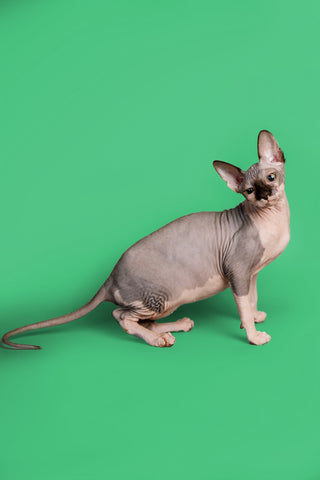Sphynx Cats vs Other Breeds: What Sets Them Apart

 Introduction
Introduction
In the world of feline companions, there's a wide array of breeds, each with its own unique characteristics and quirks. Among these, the Sphynx cat stands out as a distinctive and intriguing breed. In this article, we'll delve into what makes Sphynx cats different from other breeds, exploring their appearance, temperament, care requirements, and more.
The Appearance of Sphynx Cats
Hairlessness: A Unique Trait
One of the most striking features of Sphynx cats is their lack of fur. Unlike most other breeds, Sphynx cats are virtually hairless, which gives them a distinctive, sleek appearance. This genetic trait sets them apart from the majority of feline companions.
Wrinkled Skin and Prominent Ears
In addition to their hairlessness, Sphynx cats are known for their wrinkled skin, which adds an interesting texture to their appearance. Their large, bat-like ears are also a notable feature that distinguishes them from other breeds.
Temperament: What Makes Sphynx Cats Tick
Social and Affectionate Nature
Sphynx cats are renowned for their affectionate and sociable disposition. They thrive on human interaction and are often described as "people-oriented" cats. This strong bond with their owners sets them apart from breeds that may be more independent.
Energetic and Playful
While Sphynx cats may not have the fur to keep them warm, they compensate with boundless energy. They are highly active and enjoy playtime, making them a great choice for families or individuals who are looking for an engaging and lively companion.
Special Care Requirements for Sphynx Cats
Temperature Sensitivity
Due to their lack of fur, Sphynx cats are more sensitive to temperature extremes. They may require additional warmth in cooler climates, and it's important to provide them with cozy spots to snuggle up in.
Skin Care
Without fur to protect their skin, Sphynx cats need regular bathing to remove excess oils and debris. Additionally, it's crucial to apply sunscreen when they're outdoors to prevent sunburn.
Health Considerations for Sphynx Cats
Prone to Certain Conditions
Sphynx cats may be predisposed to certain health issues, including skin conditions and dental problems. Regular veterinary check-ups and a balanced diet are crucial for their overall well-being.
Conclusion
In conclusion, Sphynx cats are a truly unique and captivating breed with their hairless appearance, affectionate nature, and specific care requirements. For those seeking an engaging and distinctive feline companion, the Sphynx cat is an excellent choice. Expand your knowledge of Sphynx cats with insightful care tips for new owners. Delve deeper into their unique characteristics and specific needs in our comprehensive guide. For further expertise, explore more at purebredkitties.com.
Frequently Asked Questions
1. Are Sphynx cats hypoallergenic?
While Sphynx cats are not completely hypoallergenic, they are often considered more suitable for people with allergies since they have less fur to shed.
2. Do Sphynx cats get along with other pets?
Yes, Sphynx cats are generally known to be sociable and can get along well with other pets, provided proper introductions are made.
3. How often should I bathe my Sphynx cat?
Sphynx cats should be bathed regularly, about once every two to four weeks, to keep their skin clean and healthy.
4. Are Sphynx cats high-maintenance in terms of grooming?
While they don't require traditional grooming due to their lack of fur, Sphynx cats do need regular skin care, including baths and sunscreen application.
5. Are there different color variations of Sphynx cats?
Yes, Sphynx cats come in a variety of colors and patterns, though their skin is typically the same shade as their fur would be if they had it.
- Tags: sphynx











